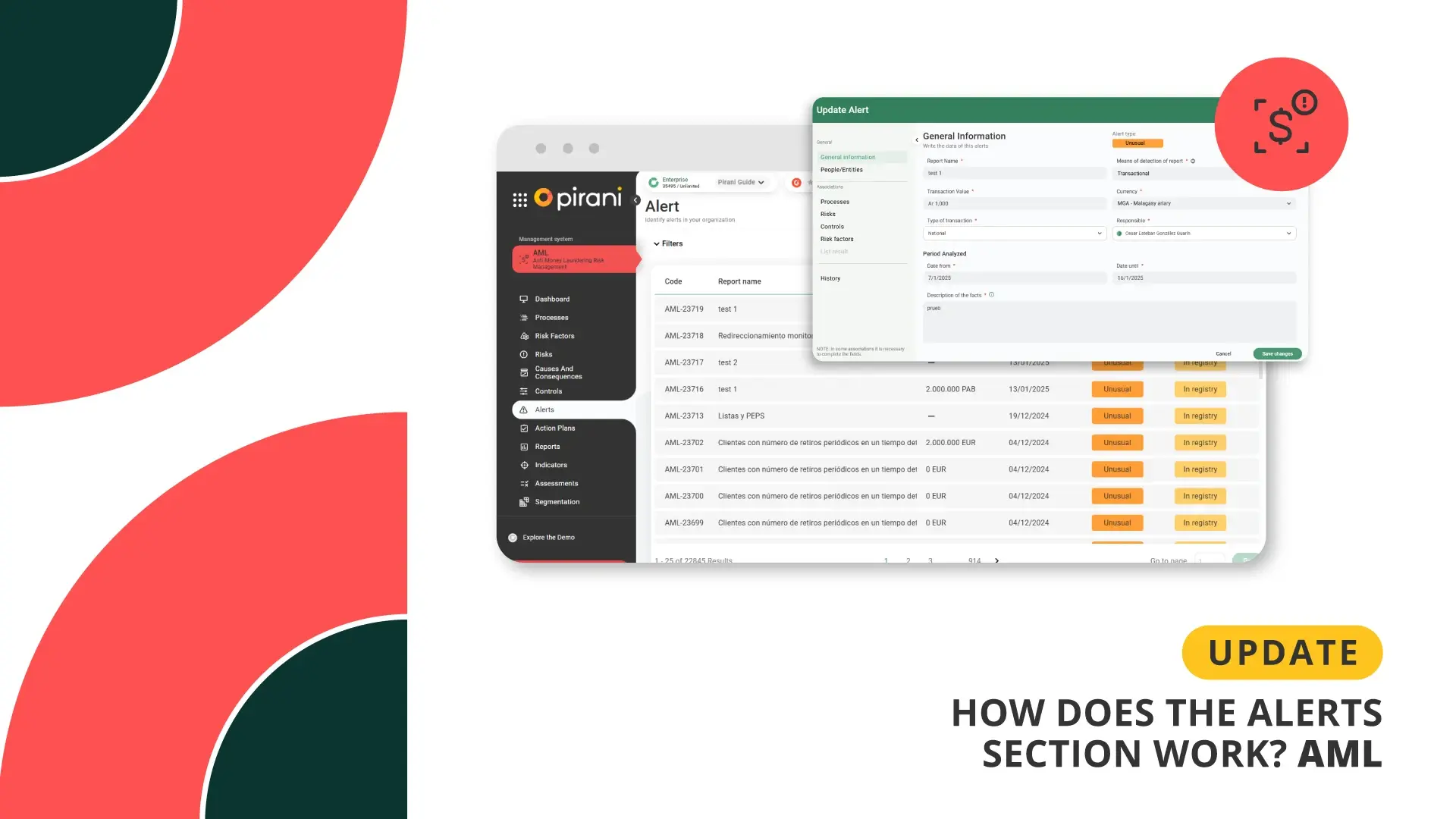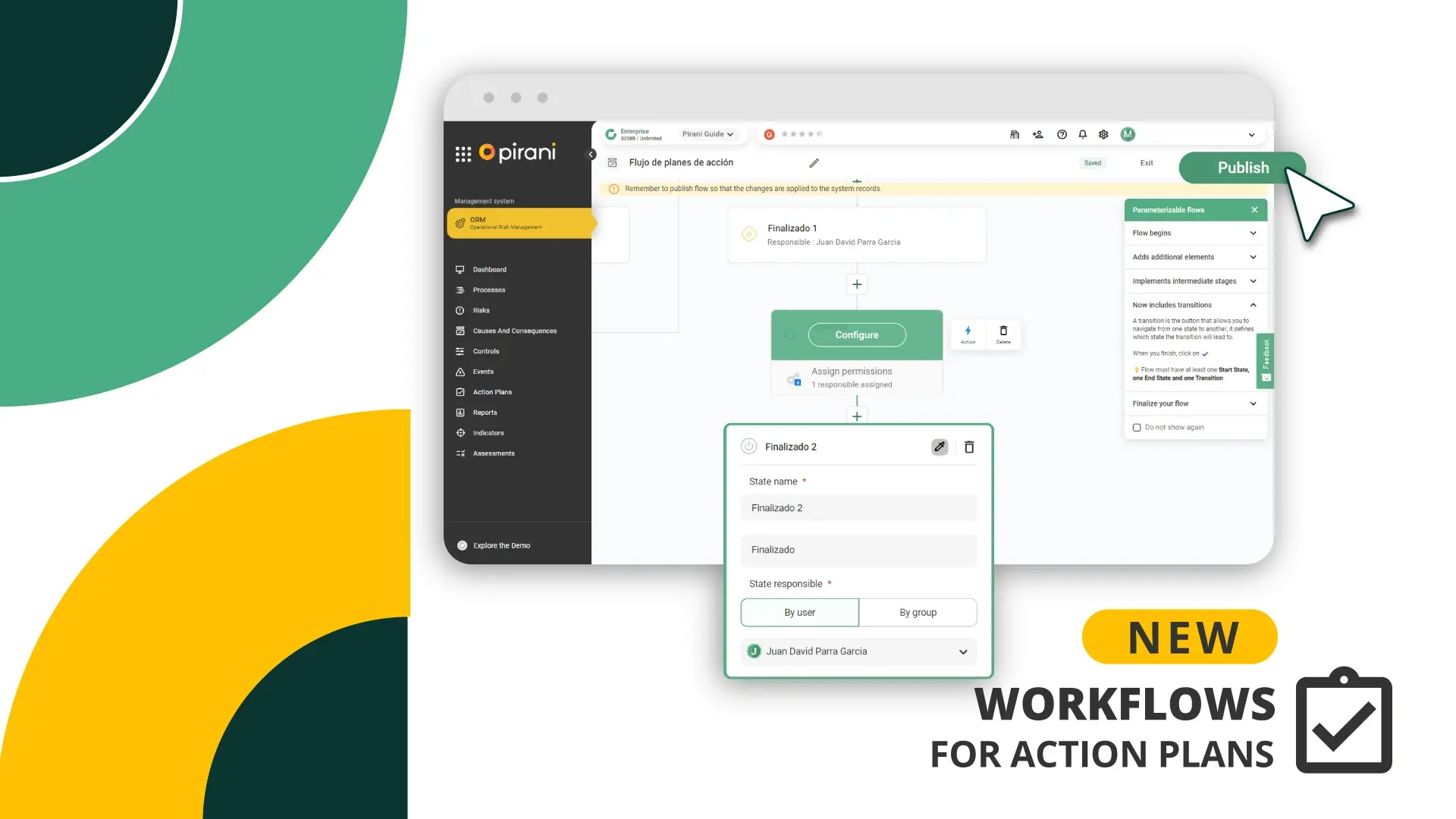Control of changes in your organization's risks
.jpg?width=1920&height=1080&name=change-control--in-the-world-of-risk-%20(1).jpg)
Tracking and analyzing each record modification is essential for efficient and secure information management. At Pirani, we understand the importance of comprehensively viewing all adjustments or modifications to risk modules (ORM, ISMS, AML, and Compliance). This is why ensuring comprehensive and accurate operations tracking through change control is essential. This improves the transparency of internal activities and facilitates analysis and investigation of incidents or operational errors by having a detailed and up-to-date history.
In this article, we will present the latest developments that allow us to visualize the changes made without sacrificing the existing information in the risk module.
What is the scope of change control?
1. Adjustments in the risk module
%205.36.01%20p.m..png?width=1920&height=991&name=Captura%20de%20pantalla%202024-08-27%20a%20la(s)%205.36.01%20p.m..png)
The update in the risk module offers the advantage of allowing the visualization of both the original data and the changes made. The user must click the 'Risk' button to access this function. The user must then select the risk to be modified; a table with the corresponding details will appear on the right-hand side of the screen. The next step is to click the 'pencil' icon to edit the information and make the necessary changes.
2. Updating data in the risk module
%205.36.53%20p.m..png?width=1919&height=993&name=Captura%20de%20pantalla%202024-08-27%20a%20la(s)%205.36.53%20p.m..png)
For clarity and simplicity, in this section, it is only necessary to enter the new information to be added. Click the 'Save changes' button at the end to complete the process.
3. Path to view the new changes
After the user adjusts or modifies the information in the risk module, he/she should go to the 'Organization Administration' section, click 'Security,' and then on 'Organization Audit Log.' There, you can view the changes made and the previously entered data, allowing you to keep an exhaustive and detailed control of all the modifications.
4. Visualization of entered data
%201.04.02%20p.m..png?width=1920&height=985&name=Captura%20de%20pantalla%202024-08-27%20a%20la(s)%201.04.02%20p.m..png)
In the 'Audit Log' section, the user can view the modifications made in each of the risk module's fields. Both previous and updated information will be displayed, providing a detailed record of all changes made.
Benefits of updating risk control
Facilitating Analysis: This update enables a thorough and rapid analysis of a security incident or operational error. Managers can review the change history to identify when and how the problem occurred, speeding up the resolution process.
Investigation Support: In situations where further investigation is needed (whether for internal or regulatory reasons), the availability of a detailed history is invaluable. It allows for reconstructing the exact scenario in which an incident occurred and identifying patterns or actions that could have contributed to the problem.
Prevention of Future Incidents: A detailed change log can identify areas of vulnerability within operational processes. This facilitates the implementation of preventive measures that can reduce the likelihood of similar errors occurring in the future.
Continuous Improvement: This update serves for incident management and provides valuable data for continuous process improvement. By analyzing the changes recorded, inefficiencies or areas where the process could be optimized can be detected, contributing to a more robust and efficient operating environment.
In Summary
The recent upgrade of the risk module has introduced greater detail and traceability in managing and monitoring records. Every modification is accurately documented, and all changes made are recorded. One of the main advantages of this improvement is the ability to continuously monitor activities within the risk module in detail, providing a clear view of each action and facilitating faster and more efficient analysis. In case of incidents or operational errors, the responsible teams can immediately access a complete history of changes, allowing them to solve problems more quickly and effectively.
Create your free Pirani account and learn how we can help you improve your organization's management.
You May Also Like
These Related Stories

Take control of access to your organization

How do the Unusual Alerts work in AML?

Characteristics of a good internal control system

Workflows for your action plans

Operational Risk Management: Strategies and Examples


No Comments Yet
Let us know what you think